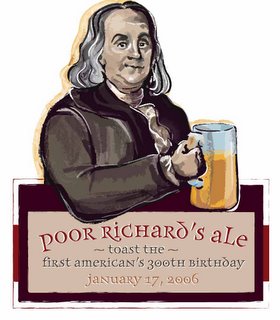 NABC will unveil its version of Poor Richard's "Old Lightning Rod" Ale on Tuesday, January 17. As of today, almost 100 breweries nationwide have chosen to participate in this celebration of Ben Franklin's 300th birthday by brewing a colonial-era recipe. It's a glimpse, albeit imperfect, into the flavor profile of the 18th-century.
NABC will unveil its version of Poor Richard's "Old Lightning Rod" Ale on Tuesday, January 17. As of today, almost 100 breweries nationwide have chosen to participate in this celebration of Ben Franklin's 300th birthday by brewing a colonial-era recipe. It's a glimpse, albeit imperfect, into the flavor profile of the 18th-century.
Members of the FOSSILS homebrewing and beer appreciation club will get a sneak preview of the ale on Sunday, January 8, as will the Serge Storms Historical Research & Debating Society, which will be meeting on the same night at Rich O's Public House.
Here's the updated story:
It wasn’t enough that Benjamin Franklin was a writer, inventor, businessman, statesman, patriot and all-purpose wit.
The creative Colonial-era legend somehow found time to drink beer, too.
In his writings, Franklin refers to the consumption of ale and describes various types of the fermented beverage, concluding that it was a healthy drink if consumed in moderation – an observation with which modern medical science concurs.
Even a teetotaler might be curious as to what these ales of old were like and how they were brewed, but unfortunately, substantive information is scant.
When the Benjamin Franklin Tercentenary, a non-profit group formed to organize the celebration for Franklin’s 300th birthday on January 17, 2006, began looking for an answer to this question, they found it by teaming with the Brewers Association, which commissioned a competition among professional brewers to formulate a Poor Richard’s Ale named for the famous Almanac.
Tony Simmons of Brick Oven Brewing produced the winning recipe, chosen by a panel of experts at the 2005 Great American Beer Festival. According to Simmons, his act of historical recreation was determined by the following factors:
Style ... Based on Franklin’s own writings, other period references and records of available raw materials, it is likely that he often drank tankards of a libation similar to Old Ale (England) or Strong Scotch Ale (Scotland).
Malt … “Low” (pale malt, similar to today’s Maris Otter or English floor malt) and “High” (darker malt, perhaps approximating a combination of what we now call Biscuit, Special Roast and Black) malts probably were used.
Adjuncts … During the Colonial era, imported malt was expensive and local barley crops were unpredictable, so the use of cracked maize and molasses in brewing was common.
Hops … Hop production in America did not begin in earnest until after Franklin’s passing, making it likely that traditional East Kent Goldings imported from England were the hops of choice.
Yeast … Not until the mid-19th century did modern scientific techniques unravel the mysteries of yeast, so it’s impossible to know very much about 18th-century yeast management. Simmons suggests that contemporary English or Scottish strains of yeast (low to moderate attenuation) will suffice to replicate Colonial fermentations.
The Brewers Association asked member breweries nationwide to join in the celebration of Benjamin Franklin’s 300th birthday by brewing a special batch of Poor Richard’s Ale and having it ready for serving on January 17, 2006.
The New Albanian Brewing Company's brewers, Jesse Williams and Jared Williamson, followed the broad contours of Simmons's recipe, adding a few touches of their own like extra finishing hops and oak chips to add wooden barrel-conditioned character. They also suggested an alternative name, "Old Lightning Rod," which we've duly incorporated to identify the finished product.
The finished product is malty and on the sweet side, both expected owing to low hopping and the use of molasses and corn as sources of fermentable sugars. We detect vanilla and banana notes alongside the unmistakable molasses component.
Several of our homebrewing friends and patrons from FOSSILS and LAGERS are said to have used the recipe parameters provided by Tony Simmons and brewed their own batches of Poor Richard’s Ale.
If you're one of them, bring your homebrewed version on the 17th, and we'll sample alongside our NABC commercial version to celebrate Benjamin Franklin’s 300th birthday.








No comments:
Post a Comment